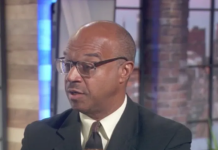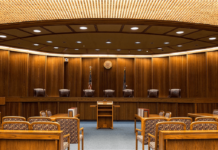(Updated to reflect comments from the governor, the new justice, Kansans for Life and Sen. Ty Masterson; Also corrects that Gerald Schultz was among the five votes for Wilson, not Terry Campbell)
Gov. Laura Kelly on Monday named a new Kansas Supreme Court justice who was criticized because of her husband’s political contributions to the governor and other candidates who supported abortion rights.
Kelly named Shawnee County District Judge Evelyn Wilson to replace Justice Lee Johnson, who retired from the court in September after serving 12 years.
Wilson is the chief judge for the 3rd Judicial Circuit, which covers Shawnee County. She was appointed to the bench in 2004.

She spent 19 years in private practice, including time as a partner in Wright, Henson, Somers, Sebelius, Clark and Baker.
Her areas of practice focused on personal injury, divorce, workers’ compensation and administrative law. She also represented the Kansas Real Estate Commission as disciplinary counsel.
She graduated from Washburn University School of Law in 1985 and received a bachelor’s degree in business and economics from Bethany College.
“In a state with rural tradition and a diversifying economy, she knows the struggles of both the family farmer and the corporate board of directors,” Kelly said.
“In a time of immense challenges in our criminal justice system, she has spent the last 15 years tackling those issues on the front lines while being a respected leader in the judicial branch,” the governor said.
Kansans for Life, the state’s leading anti-abortion group, criticized contributions Wilson’s husband made to candidates who support abortion rights.
KFL singled out contributions Wilson’s husband gave to Kelly when she ran for governor and as a state senator. Kelly supports abortion rights.
Wilson’s husband contributed $3,000 total to Kelly’s gubernatorial campaign in 2017 and 2018, campaign finance records show.
He also gave to her Senate campaign with $1,000 contributions each in 2016, 2015 and 2012.
Kelly shrugged off the criticism when asked about it during a news conference Monday morning.
“My appointments are based on qualifications,” Kelly said. “I don’t take into account popularity. I really do take into account whether they are fit to do the job. It’s my sense that Judge Wilson is more than qualified to fill this role.”
The governor said ideology was not a factor in deciding who to name to the Supreme Court.
“Ideology was really not part of the conversation with any of the nominees,” Kelly said.
“We really were looking for judicial temperament, experience and their ability to work with the other justices.”
Wilson was asked about her judicial philosophy.
“Over the course of my career, I learned that I must look at each and every case as an individual case,” Wilson said.
“It’s the most important case that is before the court to those people who go before the court,” she said.
Wilson said she looks at the law, how it has evolved and applies the facts of each case.
She declined to comment on the Supreme Court’s recent ruling that found the right to an abortion is protected by the state constitution.
Kelly praised Wilson’s ability to work in a political bubble as a Shawnee County judge.
“I’ve watched the number of times that pressure was put on the courts to rule in a certain way, to favor one ideology over another. Judge Wilson doesn’t do that,” Kelly said.
“She has built a wall around her,” the governor said. “When she is looking at something, she is looking at it through the eyes of a lawyer, not through the eyes of a politician.”
Kansans for Life said Kelly’s appointment underscores the need to pass a constitutional amendment that would not protect the right to an abortion.
“Kansans for Life is not surprised that the governor chose as a Supreme Court justice someone who supports her vision for unlimited abortion in the state,” said Jeanne Gawdun, director of government relations for KFL.
Kelly bypassed two other candidates — Dennis Depew and Steve Obermeier — who worked for Republican Attorney General Derek Schmidt.
Obermeier had been on the governor’s list of finalists for a seat on the Kansas Court of Appeals earlier this year.
For the first time this year, the nominating commission that recommended the three candidates to the governor made its votes public under a state law passed in 2016.
A review of the ballots revealed that Depew and Obermeier were the top vote-getters during the process, and Wilson emerged as the balloting progressed.
The commission — made up of five lawyers and four nonlawyers — conducted six rounds of voting, including a supplementary round to break a six-way tie after the first round.
After the first round of balloting, Depew led all candidates with nine votes, trailed by Obermeier and Thomas Malone, each with six votes. Wilson was among six candidates initially tied with four votes each.
The commission then conducted a second vote that failed to break a six-way tie before moving on to a third round.
After the first two rounds, the commission rejected a motion by Bob Hayworth — appointed by former Gov. Sam Brownback — to send the names of Deputy Attorney General Depew, Assistant Solicitor General Obermeier and Appeals Court Judge Malone to the governor. The motion died on a public 5-3 vote.
Hayworth made the same motion after the third round, and it was turned down again.
After the third round, Depew led with six votes followed by Obermeier and Malone, each with four votes.
At that point, Depew’s name was set aside and ultimately was sent to the governor.
Following the fourth round, Obermeier was tied at four votes with Wilson and Appeals Court Judge Melissa Standridge. Malone fell back with three votes after initially being one of the leaders.
Obermeier emerged as the leader with six votes after the fifth round, trailed by Wilson with five votes and Standridge with four votes.
Ultimately, Wilson’s five votes in the fifth round put her on the list of the three candidates sent to the governor.
The commission voted a sixth time to recommend the three names to the governor.
Wilson received her five votes from Garden City attorney Gerald Schultz, Gloria Farha Flentje, Frances Gorman Graves, Linda Weis and Mikel Stout.
Schultz, Stout and Flentje are lawyer members of the nominating commission. Graves was appointed by Kelly. And Weis was appointed by Brownback.
A review of the ballots reveals that Obermeier was a favorite of the three commissioners appointed by Brownback — Weis, Hayworth and former state Rep. Dennis Hedke.
All three voted for Obermeier five times, including the final voice vote that sent his name to the governor.
Kelly’s appointment to the panel — Graves — voted for Wilson six times, including the tie-breaker vote after the first round and the final voice vote.
Wilson’s selection reignited discussion that the state needs to move to a federal judicial selection model where the governor nominates judges who are confirmed by the state Senate.
Changing the process from the so-called merit selection process would require a constitutional amendment, which requires support from two-thirds of the Legislature. It would also have to be ratified by the voters.
Last session, there were 28 votes to pull a proposed constitutional amendment out of committee that would have given the governor the ability to appoint judges to the Supreme Court with Senate confirmation.
Only 24 votes were needed get it out of committee and 27 to force the debate and win approval.
Republican state Sen. Ty Masterson used the occasion of Kelly’s judicial appointment to call for changing the selection process.
“It is past time that Kansas move to a more transparent selection process like the one used for the United States Supreme Court,” Masterson said in a statement.
“The time-tested model used at the federal level is one that would shine the light of transparency on the process and give Kansans the ability to have direct input via their state Senators.”
















